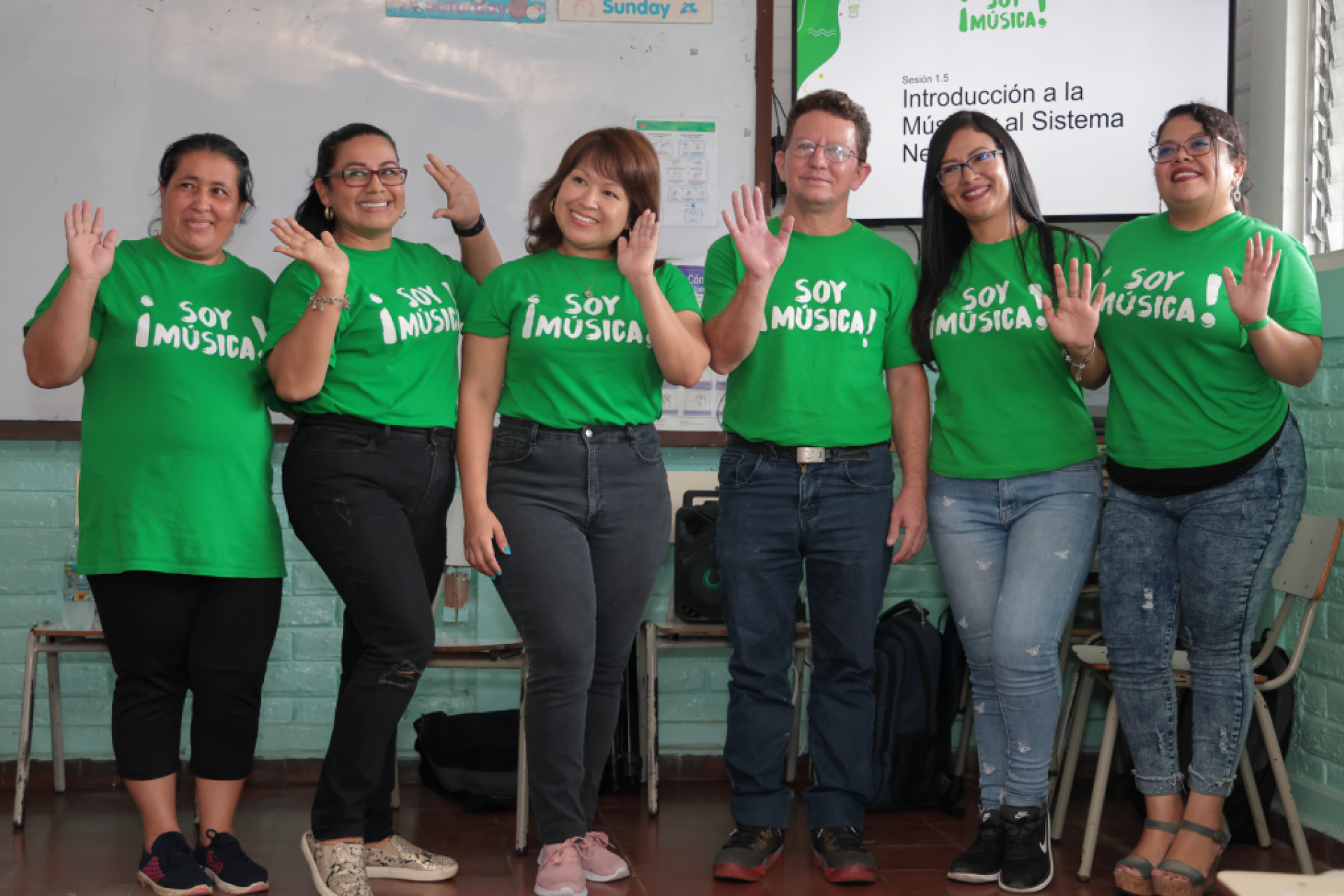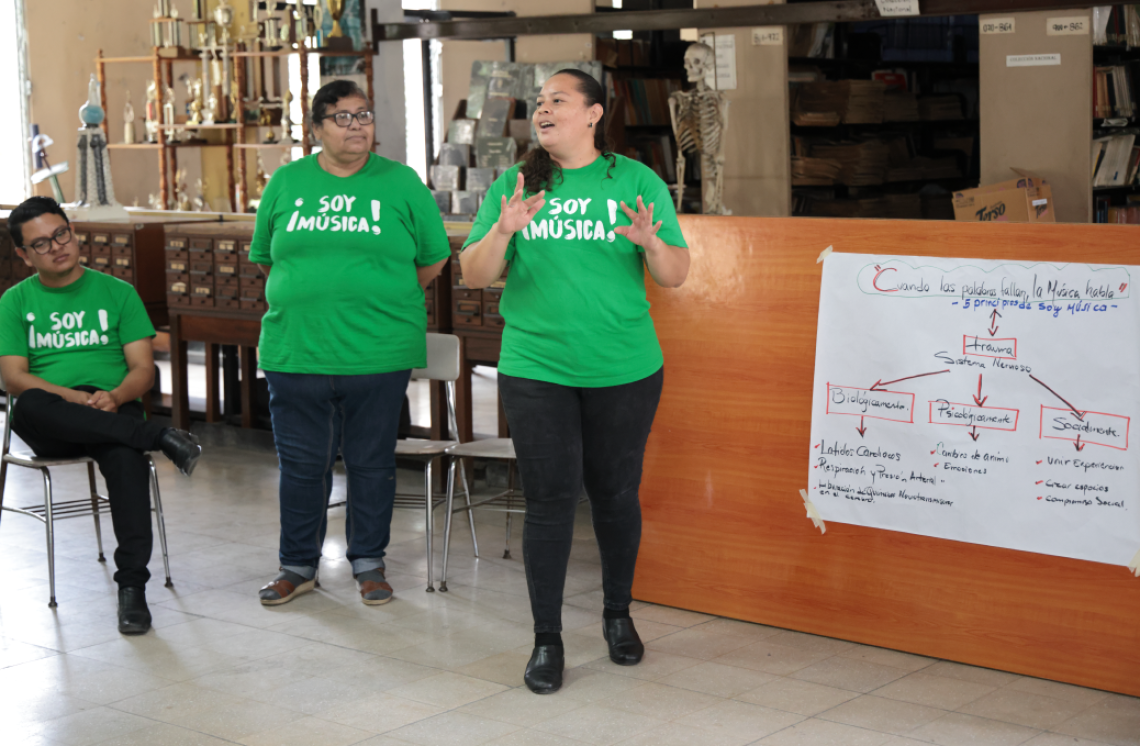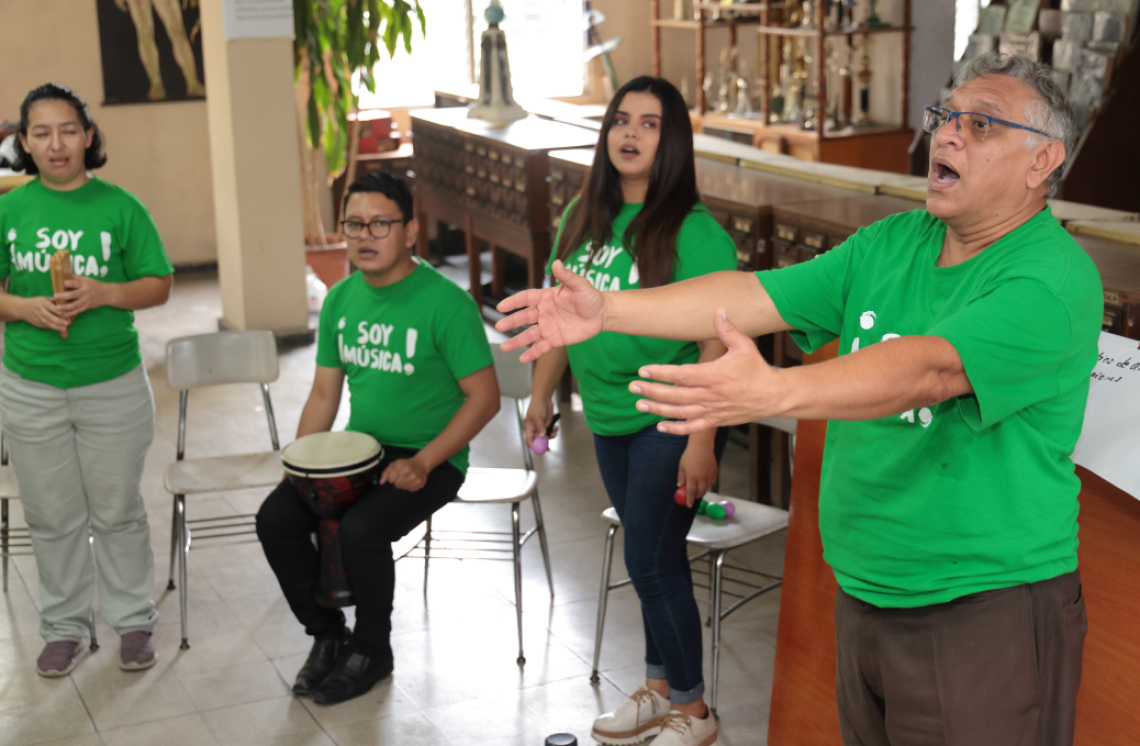This article has been translated from the original article by UNICEF El Salvador, authored by Rosarlin Hernández.
The teachers who are taking the ¡Soy Música! hybrid training recognize that this methodology is the way to get to know their students better and support them in the management of family and community crises.

@UNICEF El Salvador/Oscar Leiva
San Salvador, September 17, 2022; Candelaria Cruz Barahona has been teaching for 28 years and says that the most valuable thing about being part of the group of teachers being trained are the innovations proposed by the Soy Música methodology to motivate and support her students at the Santa Eduviges Educational Complex in Soyapango.
After more than a year of training, by the end of 2022,116 teachers from different areas of El Salvador have completed the advanced level of the Soy Música training and will become the new generation of trainers for other teachers and students in the use of music as an effective tool to bring inclusion, creativity, and a culture of peace.
“With the Soy Música methodology we have been given strategies to get closer to the students, music has been very useful for me. Because of the high levels of arrests in the country during the ongoing State of Exception [similar to a State of Emergency, or martial law] many of our students have been left alone with their grandmothers. In one class, we had up to 15 students in that same situation, and the teachers talked and organized activities such as a day of dancing,” says the language teacher.
She also adds that on that day they played, sang, and danced cumbia. Although at first the students were reluctant to participate fully in the activities, little by little, the teacher observed that they were able to take a break from the crisis that these teens experience in their homes and it helped them to move forward.
“The value and usefulness I find in the methodology is that we are a difficult country. Society itself excludes and labels teenagers, and this methodology allows us teachers to have strategies and tools to face this situation.”
Candelaria shares that when she was invited to participate in the ¡Soy Música! training, the first thing she understood was that it was about inclusion, peaceful coexistence, and self-esteem management.

@UNICEF El Salvador/Oscar Leiva
The value of ¡Soy Música! for teachers
Tatiana Villalobos is not a teacher by profession, but while learning music at the Centre of Arts for Peace in Suchitoto, she enrolled when the training program first started. She is now involved in the current training process whilst teaching music at the School Center Padre Arrupe in Soyapango.
“For me, becoming a trainer has totally changed my perspective on how I see and get to know people, on how I approach the children, not thinking so much about what I want to do but rather about how I can make sure that the children not only learn, but also have a good time.”
Tatiana highlights that this methodology is necessary in El Salvador because it primarily engages the teacher: “The teacher is the one who is with the children and if they aren’t physically, psychologically, and socially regulated, it will be difficult for them to respond to the psychosocial needs of the children. Teachers have their own problems and traumas and if they do not undergo a healing process, they will hardly be able to help the children.”
She explains that teacher participants have stated that the methodology helps them get closer to their students and to feel more confident in the classroom.
“This methodology immerses us and we love to replicate this experience.”
Leonel Urquilla has dedicated his entire life to teaching language. He is now deputy director of the Anita Alvarado School in Cojutepeque. From his experience as a trainer of this new group of teachers, he believes that this methodology applied in El Salvador has a sense of opportunity because it allows for greater understanding of who each of their students are and what learning obstacles they might be experiencing.
During the training, teachers shared their experiences and it turned out that family disintegration is a cross-cutting issue in all schools and becomes an obstacle to learning.
Currently, he warns that many students arrive at school with the trauma of seeing their parents arrested and the social responsibility of explaining the causes falls largely on teachers.
“How to help them, how to make this child feel that they are part of a group that has the possibility to move forward, to realize that they are worthy, and to help them integrate with their community, because the community unfortunately tends to marginalize and point fingers. That is the challenge that Soy Música allows us to take on”, says the assistant director.
He emphasizes that the methodology allows teachers to recognize that it is necessary to strengthen students’ self-esteem, that in school they should feel safe, included, without gender stereotypes, and with the possibility of expressing their ideas in the ways they want to: “teachers should internalize that this makes them feel better and in the long run we will have citizens with feelings of solidarity, who promote peaceful coexistence, the culture of peace, tolerance and empathy. That is why ¡Soy Música! should be part of the teachers general training curriculum.”
“The methodology is fully immersive and the teachers love it, they want to replicate the experience and the videos they send prove it.”

@UNICEF El Salvador/Oscar Leiva
Soy Música methodology according to Andrea
Andrea Asunción Menjívar, is 12 years old and attends sixth grade at the School Center Reino de Suecia, in Plan del Pito, Ayutuxtepeque.
As a student participant in the program, Andrea notes that the music activates the group and on a personal level has contributed to improve her communication skills, she is more communicative, she expresses her ideas better, and is more observant.
“I developed better communication with personal issues, we feel loved in the classroom, but with other teachers we feel we can’t express ourselves, that we don’t have rights.”
She adds that more and more teens have psychological and family problems, the reason being that they feel ‘alone’, either because their parents have migrated or, even if they live with them, they do not give them the necessary time and space to express their concerns.
“Soy Música helps us express our problems and our emotions. Now we can differentiate sadness from depression,” she concludes.
The Soy Música methodology has been implemented in El Salvador for five years. This methodology has been developed by the NGO Musicians Without Borders with MINEDUCYT (Ministry of Education) and UNICEF and tailored specifically for El Salvador. The main objective is to provide teachers and community facilitators with the appropriate techniques to foster creativity and imagination, and to promote gender equality and peaceful coexistence.
Find out more about the ¡Soy Música! program here.




